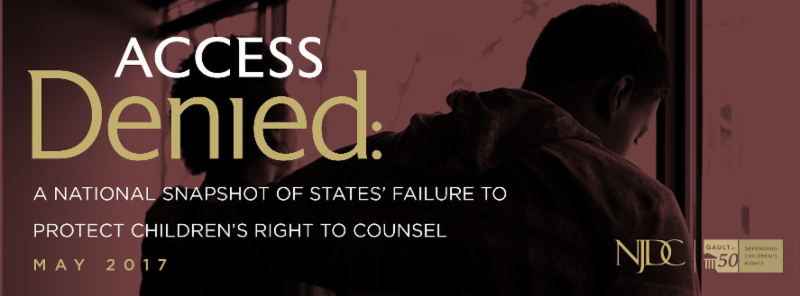New NJDC Report Documents States’ Failure to Protect Children’s Right to Counsel
The National Juvenile Defender Center (“NJDC”) has issued new report that examines a serious failure in our justice system: the systematic denial of children’s constitutional right to a public defense.
As NJDC’s troubling new report, Access Denied, documents, the U.S. Supreme Court ruled fifty years ago in In re Gault that children have a right to “the guiding hand of counsel.” Yet today, the NJDC found that there remains not a single jurisdiction in the United States that “wholly fulfills the constitutional promise of justice for children.”
The cracks in the system are many. Just eleven states mandate that every accused child be provided with an attorney. No state appoints a lawyer to every child during interrogation, and only eleven states guarantee “meaningful access” to an attorney after sentencing. In 36 states, children are required to pay for what is supposed to be a “free” public defense, with expenses ranging from $10 for an application fee to over $1,000 for attorney costs. And in 43 states, children are permitted to waive their right to an attorney without so much as a consultation with a legal professional.
At every level of involvement with the juvenile justice system, children are uniquely vulnerable. Of course, this is especially true when they lack legal representation. Some children waive their right to counsel because they fear that their families may not be able to afford an attorney. Others are deemed financially ineligible for a public defender, even though in reality their families are not able to pay for a lawyer. Children are also susceptible to coercive law enforcement tactics that may cause them to make a false confession or disclose information not in their best interests. Children often have little understanding of court procedures or the consequences of a juvenile record, which is why providing immediate access to an attorney is so important.
The NJDC makes five major recommendations aimed at strengthening minors’ right to counsel:
- Automatically declaring every child eligible for a public defender, regardless of family income;
- Appointing an attorney to every child before interrogation and “well in advance” of the first court appearance;
- Ending the practice of charging costs and fees for public defenders;
- Barring children from waiving counsel “unless and until a child has the opportunity to consult with a qualified juvenile defender” about the implications of foregoing that right; and
- Guaranteeing a right to counsel in the post-sentencing period.
Chicago Appleseed supports these proposed reforms. Presently, Illinois only meets recommendations 2 and 4, and only for a select group of children: those under 15 years old who are charged with certain serious offenses. (See 705 ILCS 405/5-170). These victories were hard won by the advocates at Juvenile Justice Initiative, the Children and Family Justice Center at Northwestern University Pritzker School of Law, and others. Access Denied challenges us to go further in Illinois and continue to be a national leader in juvenile justice.
In our own work, Chicago Appleseed has fought to ensure that Cook County residents are able to exercise their Sixth Amendment right to a public defense. In 2013, in response to an investigation led by Chicago Appleseed and the Chicago Council of Lawyers, Cook County Chief Judge Timothy C. Evans issued General Administrative Order No. 2013-11 prohibiting the courts from denying a public defender without first conducting an inquiry into the defendant’s ability to pay.
This year, we worked collaboratively with First Defense Legal Aid to establish a new program that enables people in Chicago Police custody to have access to an attorney free of charge, and we have been tasked to evaluate this program. We have also engaged in efforts aimed at reducing court fines, fees, and costs. Last year, Chicago Appleseed and other advocates prevented a proposed County budget amendment that would have increased charges levied on accused persons who receive a public defense.
We are proud of our efforts to secure the constitutional right to a public defense, which have advanced our mission of making the courts fairer, more accessible and more effective.

